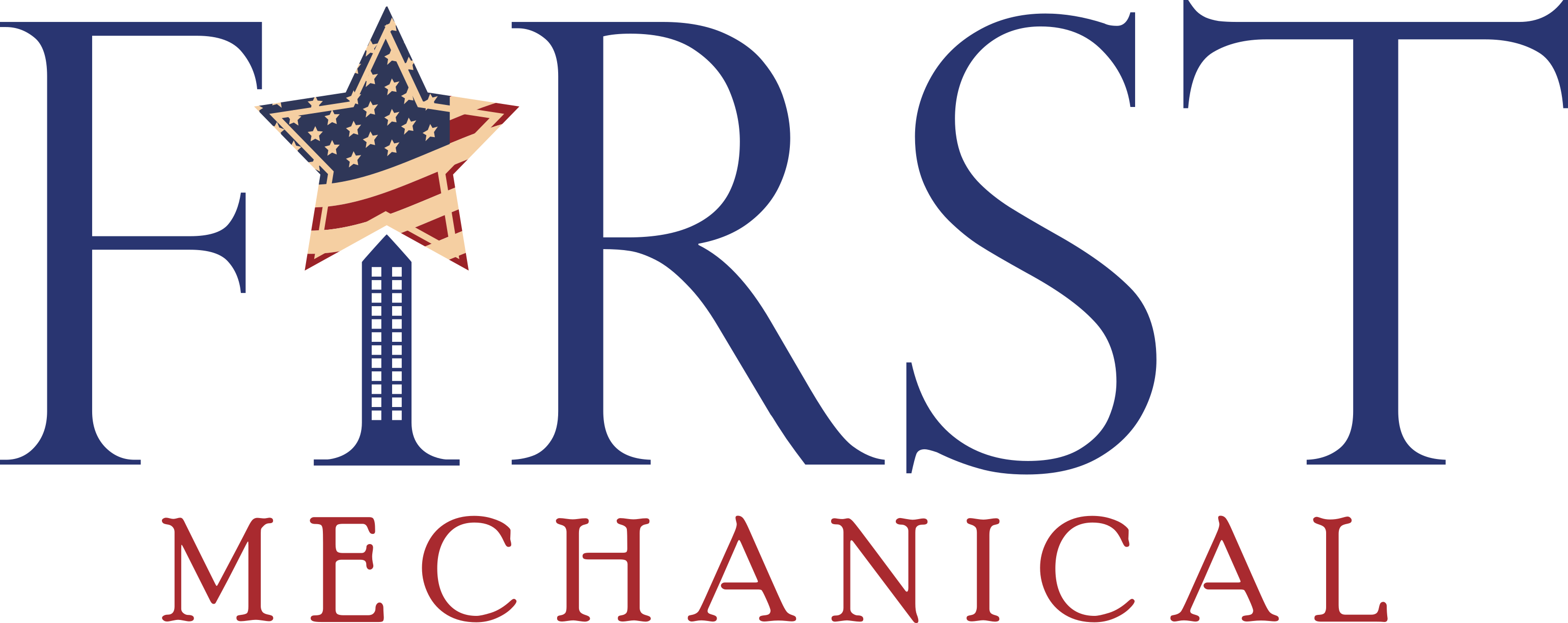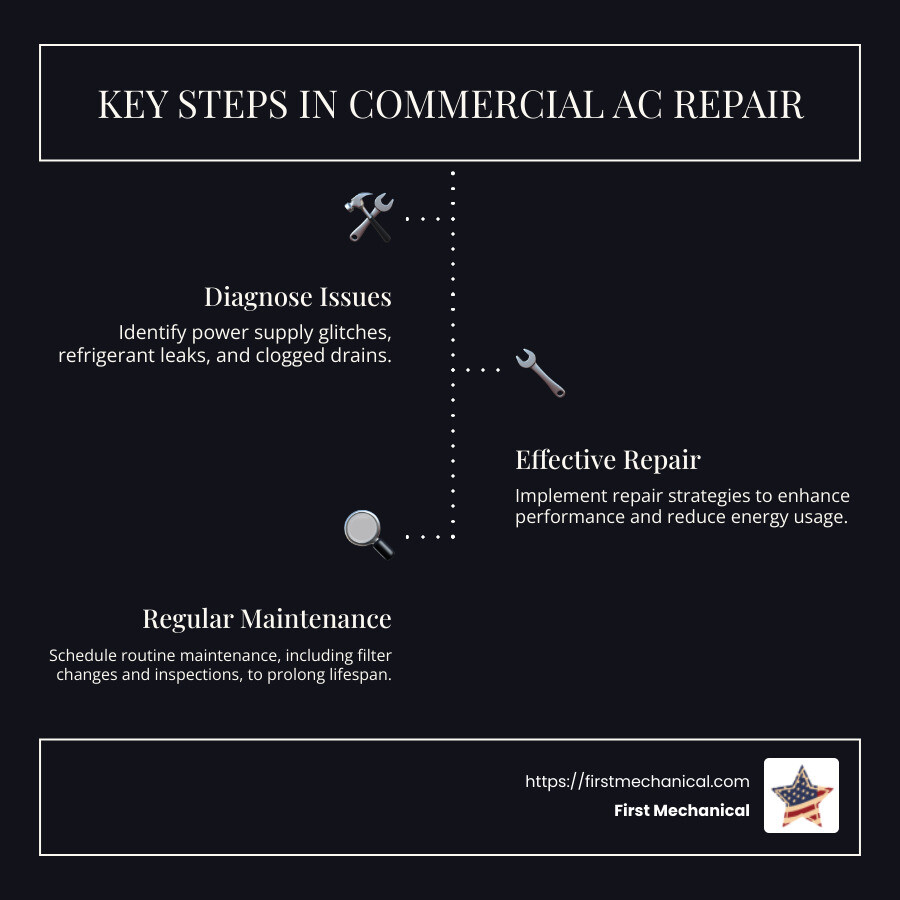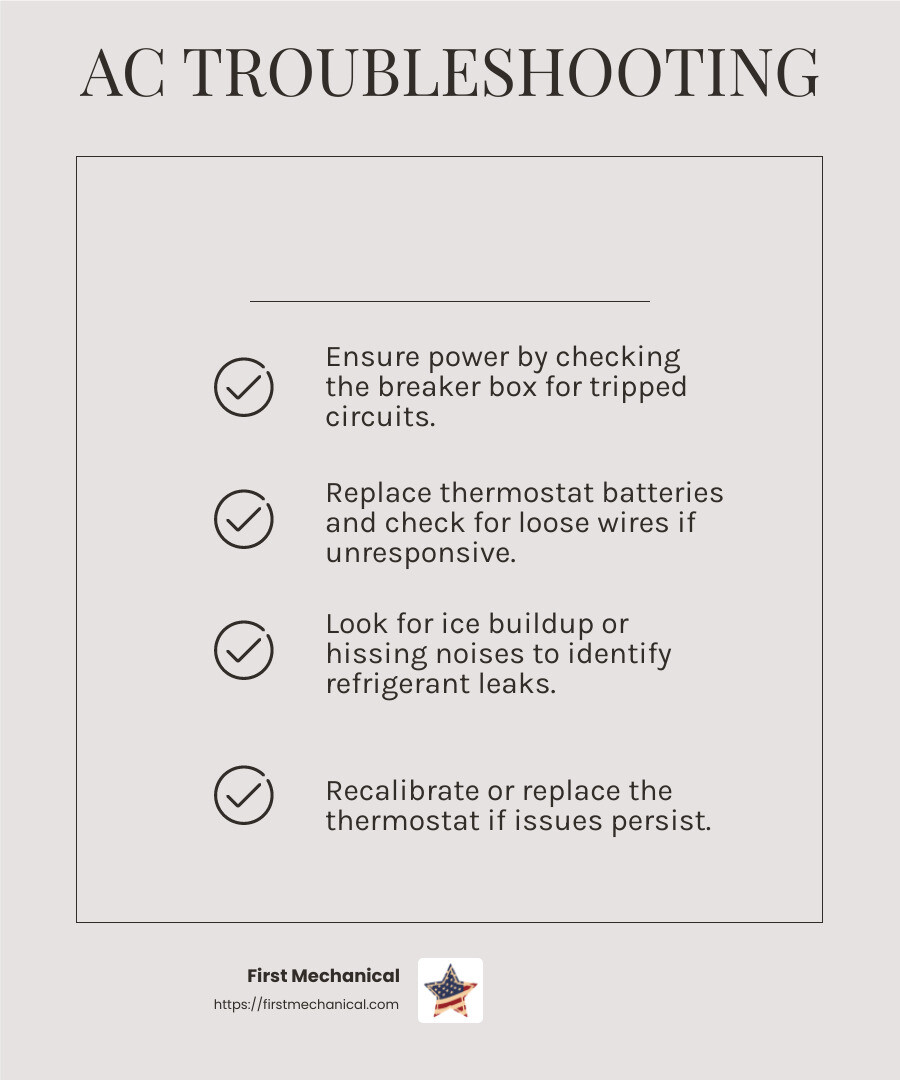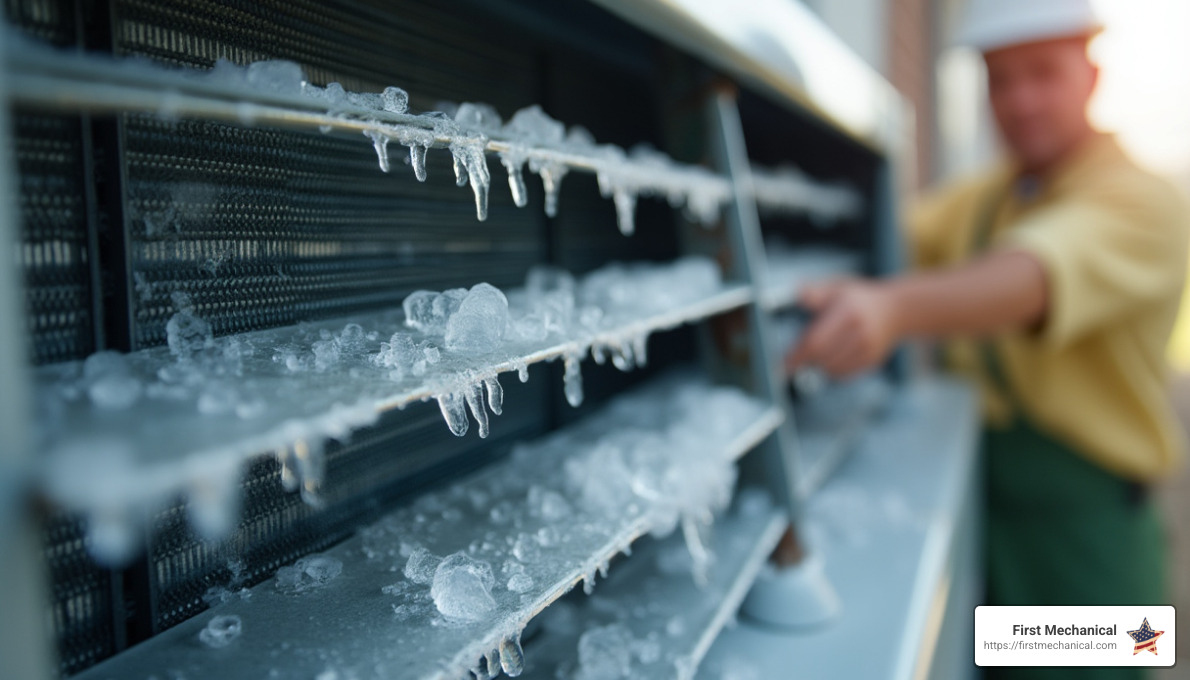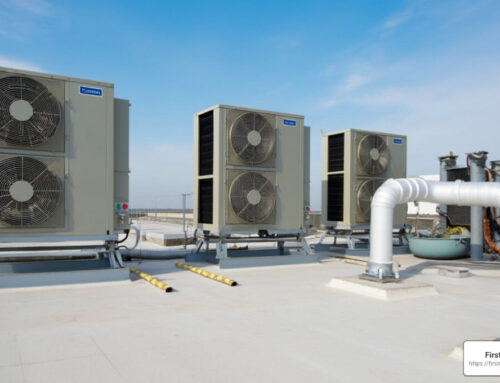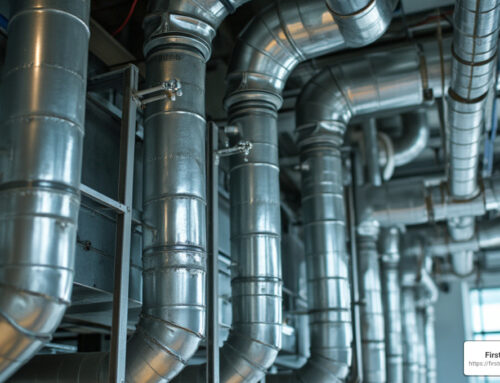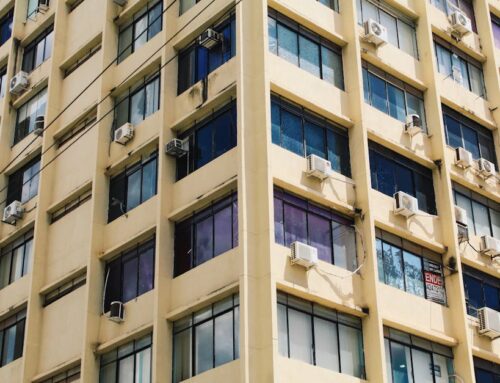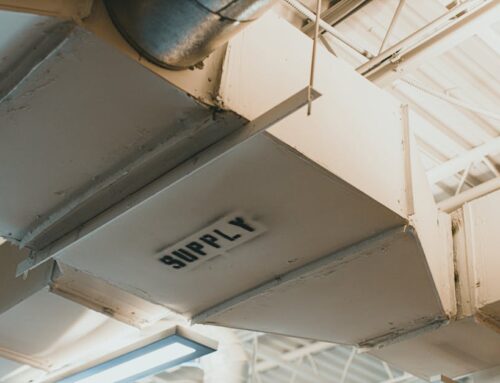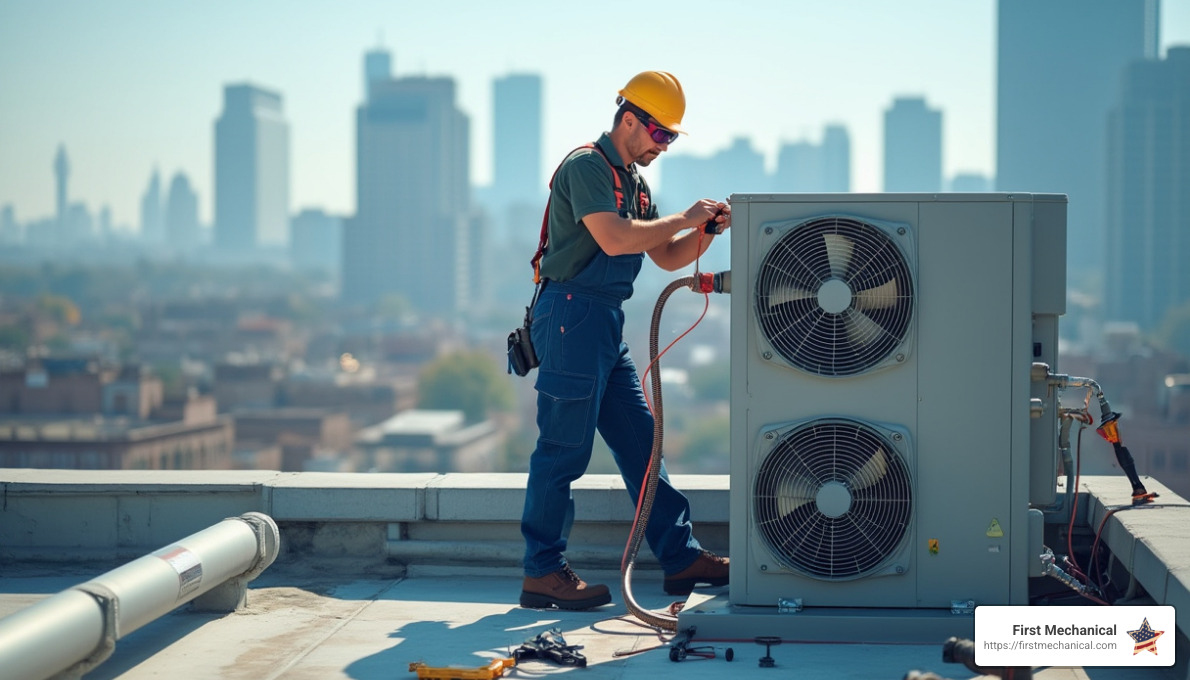
Commercial air conditioning repair is crucial for maintaining comfort in large commercial spaces. For professionals like Facility Manager Frank, understanding and addressing common AC issues ensures smooth operations and tenant satisfaction. Here’s a straightforward breakdown of key points:
-
Lifespan: Commercial AC systems typically last between 10 to 20 years. Regular upkeep can greatly influence this duration, preventing costly replacements.
-
Common Issues: Many problems stem from power supply glitches, refrigerant leaks, and clogged drains. Early detection and repair can save time and money.
-
Maintenance: Routine maintenance, like filter changes and equipment inspections, ensures efficiency and prolongs the life of the system.
Effective commercial air conditioning repair strategies improve system performance, reduce energy usage, and minimize unexpected downtime. Paying attention to these factors can prevent disruptions and keep operational costs in check for facilities like Frank’s.
Commercial air conditioning repair helpful reading:
Diagnosing Common Commercial AC Problems
Diagnosing issues in commercial air conditioning systems can be straightforward if you know what to look for. Here’s a simple guide to help you identify some common problems.
Power Supply Issues
No Power? This could be due to faulty wiring, tripped breakers, or an overheated system. A quick check of the circuit breaker and wiring connections should be your first step.
- Tip: Ensure that the AC unit is receiving power by checking the breaker box for any tripped circuits. Reset them if necessary.
Thermostat Settings
A faulty thermostat can lead to temperature inconsistencies or a system that won’t start. If your AC isn’t responding to adjustments, the thermostat might need new batteries, rewiring, or recalibration.
- Quick Fix: Replace batteries and check for loose wires. If the problem persists, recalibrate the thermostat or consider a replacement.
Refrigerant Leaks
A refrigerant leak can severely impact cooling efficiency. Look for signs like ice buildup on evaporator coils or hissing noises near the refrigerant lines.
- Solution: Contact a licensed technician to locate and fix the leak. They will also recharge the system with the correct refrigerant.
Condenser Coils
Dirty condenser coils can lead to poor cooling performance and increased energy use. Regular cleaning can prevent these issues.
- Maintenance Tip: Schedule routine inspections to keep the coils clean and ensure optimal performance.
By understanding these common issues, you can take proactive steps to maintain your commercial AC system. Regular checks and maintenance not only prevent problems but also extend the lifespan of your unit.
Next, we’ll dive into specific commercial air conditioning repair techniques that can help fix these issues efficiently.
Commercial Air Conditioning Repair Techniques
Once you’ve diagnosed the problem, it’s time to dive into commercial air conditioning repair techniques. Here, we’ll cover some practical steps to address common issues like reset procedures, faulty parts, duct repair, and electrical connections.
Reset Procedures
Sometimes, a simple reset can solve many issues. If your system isn’t working properly, try these steps:
-
Turn off the Power: Switch off the AC unit at the circuit breaker to prevent any electrical mishaps.
-
Locate the Reset Button: Some units have a reset button. Press and hold it for a few seconds.
-
Restart the System: Turn the power back on and check if the system operates normally.
Note: If these steps don’t work, further investigation into faulty parts might be necessary.
Faulty Parts
Identifying and replacing faulty parts can be crucial in the repair process. Here are some common culprits:
-
Fan Belts: A squealing sound often indicates a worn-out fan belt. Replacing it can prevent further damage.
-
Motors and Compressors: If the fan runs but no cool air comes out, the compressor might be faulty. Consider consulting a professional for repair or replacement options.
-
Evaporator Coils: Frozen coils can lead to warm air output. Address airflow issues and clean the coils for better performance.
Regular inspection and maintenance can help catch these problems early, avoiding costly repairs.
Duct Repair
Ductwork is essential for efficient air distribution. If you notice uneven cooling, it might be time to inspect the ducts:
-
Check for Leaks: Look for visible gaps or damaged areas in the ductwork. Sealing these can improve efficiency.
-
Clear Blockages: Ensure that vents are not obstructed by furniture or debris, allowing for proper airflow.
Professional duct cleaning every 3 to 5 years can also improve system performance.
Electrical Connections
Electrical issues can disrupt your entire system. Regular checks can prevent these problems:
-
Inspect Wiring: Look for loose or corroded connections. Tighten or replace them as needed.
-
Check Capacitors: Faulty capacitors can cause the system to stop working. Replacing them can solve the issue.
-
Safety First: Always turn off the power before inspecting electrical components to avoid accidents.
By addressing these areas, you can effectively repair and maintain your commercial air conditioning system. Next, we’ll explore the benefits of regular maintenance to keep your system running smoothly.
Benefits of Regular Maintenance
Keeping up with regular maintenance for your commercial air conditioning system offers several key benefits. Let’s explore how it boosts energy efficiency, extends system lifespan, and improves indoor air quality.
Energy Efficiency
Regular maintenance is like a tune-up for your AC system. When all parts are clean and functioning well, the system doesn’t have to work as hard. This means it uses less energy to cool your space, which can significantly lower your utility bills.
-
Clean Coils and Filters: Dirty coils and filters make your AC work harder, using more energy. Regular cleaning keeps them efficient.
-
Lubricated Parts: Proper lubrication reduces friction in moving parts, saving energy.
-
Tight Electrical Connections: Well-maintained electrical connections ensure smooth operation and prevent energy loss.
System Lifespan
Think of maintenance as a way to add years to your AC’s life. Just like a car, your AC needs regular check-ups to stay in top shape. Addressing minor issues early can prevent major breakdowns later.
-
Preventive Care: Regular inspections catch small problems before they become big ones. This can prevent costly repairs or replacements.
-
Reliable Performance: A well-maintained system is less likely to break down unexpectedly, providing consistent comfort.
-
Longer Equipment Life: By reducing wear and tear, maintenance can help your AC last beyond the typical 10-year lifespan.
Indoor Air Quality
Your AC system plays a crucial role in maintaining air quality. Regular maintenance ensures that the air circulating through your building is clean and healthy.
-
Filter Changes: Clean filters trap dust and allergens, improving the air you breathe.
-
Duct Cleaning: Removing dust and debris from ducts prevents them from being blown into your space.
-
Mold Prevention: Addressing excess humidity and cleaning components can prevent mold growth, which can harm air quality.
Regular maintenance isn’t just a good idea—it’s essential for keeping your commercial air conditioning system running efficiently, reliably, and safely. Up next, we’ll tackle some frequently asked questions about commercial air conditioning repair to address common concerns and solutions.
Frequently Asked Questions about Commercial Air Conditioning Repair
What is the lifespan of a commercial air conditioner?
Most commercial air conditioners last between 10 to 20 years. However, this depends on factors like usage, maintenance, and environmental conditions. Regular maintenance can help your unit reach the upper end of this range. Without it, you might face major repairs or even need a replacement sooner.
Why is my commercial AC not working?
If your commercial AC isn’t working, there could be several reasons:
-
Power Supply Issues: Check if the unit is receiving power. A tripped circuit breaker or a blown fuse could be the culprit.
-
Thermostat Problems: Ensure the thermostat is set correctly. Sometimes, incorrect settings or a malfunctioning thermostat can prevent the AC from turning on.
-
Refrigerant Leaks: Low refrigerant levels due to leaks can lead to inadequate cooling. If you suspect a leak, it’s important to call a professional.
How do you reset a commercial air conditioner?
Resetting your commercial air conditioner can sometimes solve minor issues. Here’s a simple guide:
-
Turn Off the System: Switch off the unit at the thermostat.
-
Locate the Circuit Breaker: Find the breaker that controls your AC unit and turn it off. Wait a few minutes before turning it back on.
-
Use the Reset Button: Some units have a reset button. Press it if available.
-
Restart the System: Turn the thermostat back on and set it to the desired temperature.
If these steps don’t resolve the issue, it might be time to contact a professional for further inspection and repair.
These FAQs address common concerns and solutions related to commercial air conditioning repair. If you’re still experiencing problems, it might be time to consult with a professional to ensure your system is running smoothly.
Conclusion
At First Mechanical, we understand the importance of keeping your commercial air conditioning systems running smoothly. Our comprehensive services cover everything from installation to maintenance and repair. Whether you’re dealing with a minor hiccup or a major breakdown, our team is ready to provide swift and effective solutions custom to your needs.
Emergency repairs are a cornerstone of our service. We know that downtime can impact your business significantly, which is why we offer fast response times to get your system back up and running as quickly as possible. Our technicians are fully licensed and insured, ensuring that you’re in capable hands.
With locations in Tampa, FL, and Melbourne, FL, we’re well-positioned to serve businesses throughout Florida. Our commitment to customer satisfaction and energy-efficient solutions means that you can trust us to handle your HVAC needs with expertise and care.
To learn more about our commercial HVAC services or to schedule an appointment, visit our commercial HVAC installation service page. Let First Mechanical be your partner in maintaining a comfortable and efficient environment for your business.
